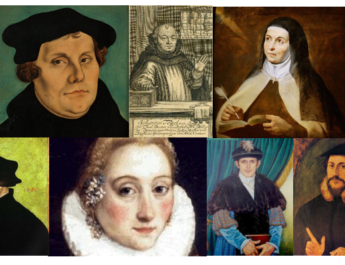Leviticus 21
BibleHub
1 The LordI said to Moses,II “Speak to the priests,III the sonsIV of Aaron,V and say to them:
Notes on verse 1a
I “Lord” = YHVH. From havah (to be, become) or hayah (to come to pass, become, be). This is the name of the God of Israel, the self-existent and eternal one, the tetragrammaton. This pronunciation has been lost to time so “Lord” is generally used in its place.
II “Moses” = Mosheh. From mashah (to pull out in a literal or figurative sense, to draw out) OR from Egyptian mes or mesu (child, son i.e. child of…). This is Moses – the one drawn out from the water, which is to say, rescued. If derived from the Egyptian, his name would share a root with Rameses and Thutmose.
III “priests” = kohen. This is literally the one who officiates i.e. the priest. This is where the Jewish last name “Cohen” (and its variants) comes from.
IV “sons” = ben. From banah (to build or obtain children). This is son, age, child. It is son in a literal or figurative sense.
V “Aaron” = Aharon. Derivation uncertain. May mean “bearer of martyrs” OR be related to Ancient Egyptian ꜥḥꜣ rw (warrior lion) OR elevated, exalted, high mountain. This is Aaron. See https://en.wiktionary.org/wiki/Aaron
“No one shall defileVI himself for a dead personVII among his relatives,VIII
Notes on verse 1b
VI “defile” = tame. This is to defile, be unclean, pollute in a ritual or ethical sense.
VII “dead person” = nephesh. Related to naphash (to refresh or be refreshed). This is soul, self, person, emotion. It is a breathing creature. Can also refer to appetites and desires.
VIII “relatives” = am. From amam (to darken, hide, associate; creating shadows by huddling together). This is people or nation. It can be used specifically for a tribe, collectively of troops or armies, or figuratively to refer to a flock of animals.
2 except for his nearestIX kin:X his mother,XI his father,XII his son, his daughter,XIII his brother;XIV
Notes on verse 2
IX “nearest” = qarob. From qarab (to come near, offer, make ready). This is near whether nearby, related, near in time, or allied.
X “kin” = sheer. 16x in OT. Perhaps from sha’ar (properly, swelling up i.e. being left over; a remnant, remaining, being redundant). This is flesh, body, meat, kin, self.
XI “mother” = em. This is a mother as binding a family together or a breeding female animal. It could be mother in a literal or figurative sense.
XII “father” = ab. This is father, chief, or ancestor. It is father in a literal or figurative sense.
XIII “daughter” = bat. Related to “sons” in v1. From ben (see note IV above). This is daughter in a literal or figurative sense.
XIV “brother” = ach. This is brother, kindred, another, other, like. It is literally brother, but it can also be someone who is similar, resembling, or related to.
3 likewise, for a virginXV sisterXVI closeXVII to him because she has hadXVIII no husband,XIX he may defile himself for her.
Notes on verse 3
XV “virgin” = betulah. This is virgin, maiden, or bride. Can also be used figuratively for a place.
XVI “sister” = achot. Related to “brother” in v2. From the same as ach (see note XIV above). This is sister in a literal or figurative sense. It can also mean another or together.
XVII “close” = qarob. Same as “nearest” in v2. See note IX above.
XVIII “had” = hayah. Related to “Lord” in v1. See note I above.
XIX “husband” = ish. Perhaps from enosh (human, humankind, mortal); from anash (to be weak, sick, or frail). This is man, husband, another, or humankind.
4 But he shall not defile himself for those related to him by marriageXX and so profaneXXI himself. 5 They shall not makeXXII bald spotsXXIII upon their headsXXIV
Notes on verses 4-5a
XX “those related to him by marriage” = baal + am. Baal is from baal (to marry, have dominion, be master). This is lord, owner, ally, master, or archer. Am is from amam (to darken, hide, associate; creating shadows by huddling together). This is people or nation. It can be used specifically for a tribe, collectively of troops or armies, or figuratively to refer to a flock of animals.
XXI “profane” = chalal. This is to pierce, which implies to wound. It is used figuratively for making someone or something profane or breaking your word. It can also mean to begin as though one opened a wedge. Also, to eat something as a common thing.
XXII “make” = qarach. 5x in OT. This is to shave to the point of baldness.
XXIII “bald spots” = qorchah. Related to “make” in v5. 11x in OT. From qarach (see note XXII above). This is baldness – from shaving or plucking. It could also be a bald spot
XXIV “heads” = rosh. This may come a word that means to shake. It is the head, captain, or chief. It can also be excellent or the forefront. It can be first in position or in statue or in time (i.e. the beginning).
or shaveXXV off the edgesXXVI of their beardsXXVII or makeXXVIII any gashesXXIX in their flesh.XXX
Notes on verse 5b
XXV “shave” = galach. This is to shave, be bald, or figuratively to lay waste.
XXVI “edges” = peah. From paah (to puff, scatter, cut in pieces) OR poh (here, side). This is a side, edge, region, temple, corner.
XXVII “beards” = zaqan. 19x in OT. Perhaps from zaqen (to grow old, an old person). This is beard, especially as referring to someone older.
XXVIII “make” = sarat. 3x in OT. This is to scratch, cut or injure.
XXIX “gashes” = seret. Related to “make” in v5. 2x in OT. From sarat (see note XXVIII above). This is a cutting or incision.
XXX “flesh” = basar. From basar (being a messenger, publish, carry preach; properly, this is being fresh, rosy or cheerful as one bearing news). This is flesh, the body, fat, skin, self, nakedness, humankind, or kin. It can also refer to private parts.
6 They shall be holyXXXI to their GodXXXII and not profane the nameXXXIII of their God,
Notes on verse 6a
XXXI “holy” = qadosh. From qodesh (set apart and so sacred; God is different from us and so God is holy/set apart; things we dedicate to God’s service are set apart for God and so they, too, are holy); related to qadash (set apart, consecrated, hallowed, sanctified; something or someone set apart for a holy purpose or use – ceremonially or morally clean). This is sacred or holy in a ritual or moral sense. As a noun, it refers to a holy one (like a saint or angel), a holy place (the sanctuary), or God (the Holy One).
XXXII “God” = Elohim.
XXXIII “name” = shem. May be from sum (to put, place, set). This is name, fame, renown. A name was thought to indicate something essential about a person – something about their individuality. So, this word can also mean honor, authority, or character.
for they offerXXXIV the Lord’s offerings by fire,XXXV the foodXXXVI of their God; therefore they shall be holy.XXXVII
Notes on verse 6b
XXXIV “offer” = qarab. Related to “nearest” in v2. See note IX above.
XXXV “offerings by fire” = ishsheh. From eshshah (a fire); from esh (fire, burning, flaming, hot; fire in a literal or figurative sense). This is an offering by fire or a burnt offering. More broadly, it can refer to any kind of sacrifice.
XXXVI “food” = lechem. From lacham (to eat, feed on). This is bread, food, loaf. It can refer to food more generally for people or for animals.
XXXVII “holy” = qodesh. Related to “holy” in v6. See note XXXI above.
7 They shall not marryXXXVIII a prostituteXXXIX or a womanXL who has been defiled;XLI neither shall they marry a woman divorcedXLII from her husband. For they are holyXLIII to their God,
Notes on verse 7
XXXVIII “marry” = laqach. This is to take, accept, carry away, receive. It can also have the sense of take a wife or take in marriage.
XXXIX “prostitute” = zanah. This is being or playing a prostitute. Figuratively, it can also mean fornicating.
XL “woman” = ishshah. Related to “husband” in v3. From ish (see note XIX above). This is woman, wife, or female.
XLI “defiled” = chalal. Related to “profane” in v4. From chalal (see note XXI above). This is to pierce, profane or pollute. It can also refer to slain or deadly.
XLII “divorced” = garash. This is to cast out or expel. It can be to exile someone or to divorce them.
XLIII “holy” = qadosh. Same as “holy” in v6. See note XXXI above.
8 and you shall treat them as holy,XLIV since they offer the food of your God; they shall be holyXLV to you, for I the Lord, I who sanctifyXLVI you, am holy.XLVII 9 When the daughter of aXLVIII priest profanes herself through prostitution,XLIX she profanes her father; she shall be burned to death.L
Notes on verses 8-9
XLIV “treat…as holy” = qadash. Related to “holy” and “holy” in v6. From qodesh (see note XXXI above). This is set apart, consecrated, hallowed, sanctified. This is something or someone that is set apart for a holy purpose or use – ceremonially or morally clean.
XLV “holy” = qadosh. Same as “holy” in v6. See note XXXI above.
XLVI “sanctify” = qadash. Same as “treat…as holy” in v8. See note XLIV above.
XLVII “holy” = qadosh. Same as “holy” in v6. See note XXXI above.
XLVIII {untranslated} = ish. Same as “husband” in v3. See note XIX above.
XLIX “prostitution” = zanah. Same as “prostitute” in v7. See note XXXIX above.
L “burned to death” = esh + saraph. Literally, “burned with fire.” Esh is related to “offerings by fire” in v6. See note XXXV above. Saraph is to burn or kindle. This is the root that “seraphim” comes from.
10 “The priest who is exaltedLI above his brothers, on whose head the anointingLII oilLIII has been pouredLIV and who has been consecratedLV
Notes on verse 10a
LI “exalted” = gadol. From gadal (to grow up, become great, become wealthy – to advance. The root meaning may be to twist in the sense of the process of growing). This is great, high, bigger, noble, old, marvelous. It can also refer to someone who is powerful or distinguished.
LII “anointing” = mishchah. From mashach (to smear or anoint; to run oil on, to consecrate). This is the act of anointing, ointment, or a consecrated thing.
LIII “oil” = shemen. From shamen (to shine, which implies being oily, growing fat). This is fat, oil, grease, olive oil – often with perfume. Used figuratively for fertile, lavish, rich.
LIV “poured” = yatsaq. This is to pour out, flow, wash away, or overflow. It can imply melting as one does to cast metal. By extension, it can refer to something being steadfast, stiffened, firmly in place.
LV “consecrated” = male + yad. Male is fill, satisfy, replenish, accomplish, fulfill, confirm, or consecrate. It is fill in a literal or figurative sense. Yad is hand, ability, power. Hand in a literal sense, but also what one can do or the means by which one does it.
to wearLVI the vestments,LVII shall not dishevelLVIII his hairLIX nor tearLX his vestments.
Notes on verse 10b
LVI “wear” = labash. This is to wrap around, which implies clothing oneself or someone else. This is wrapping around in a literal or figurative way.
LVII “vestments” = beged. From bagad (to cover or conceal; figuratively, to act in a covert or treacherous way, to transgress or pillage). This is clothing, garment, robe, or some other kind of clothing. Figuratively, it can be treachery or pillaging.
LVIII “dishevel” = para. 16x in OT. This is to loosen, let alone, uncover, avoid, dismiss, or perish.
LIX “hair” = rosh. Same as “heads” in v5. See note XXIV above.
LX “tear” = param. 3x in OT– all in Leviticus. This is to tear or rend as when one rips clothing.
11 He shall not goLXI where there isLXII a deadLXIII body;LXIV he shall not defile himself even for his father or mother.
Notes on verse 11
LXI “go” = bo. This is to enter, come in, advance, fulfill, bring offerings, enter to worship, attack. It can also have a sexual connotation.
LXII {untranslated} = kol. From kalal (to complete). This is all or every.
LXIII “dead” = mut. This is to die in a literal or figurative sense. It can also refer to being a dead body.
LXIV “body” = nephesh. Same as “dead person” in v1. See note VII above.
12 He shall not go outsideLXV the sanctuaryLXVI and thus profane the sanctuary of his God, for the consecrationLXVII of the anointing oil of his God is upon him: I am the Lord. 13 He shall marry only a woman who is a virgin.LXVIII
Notes on verses 12-13
LXV “go outside” = yatsa. This is to go or come out, bring forth, appear. It is to go out in a literal or figurative sense.
LXVI “sanctuary” = miqdash. Related to “holy” and “holy” in v6 & “treat…as holy” in v8. From the same as qodesh (see note XXXI above). This is a sacred place, sanctuary, holy place. It is something or somewhere that is consecrated, whether to God or to another.
LXVII “consecration” = nezer. From nazar (to dedicate, set apart, fast, keep self from impurity, refrain from worship; to consecrate for a holy purpose). This is something set apart, so it is a consecration. It could be used for one who takes the Nazirite vow or a priest. In reference to the Nazirite vow, it can also refer to uncut hair. It can also refer to a crown, as of a king.
LXVIII “virgin” = betulim. Related to “virgin” in v3. 10x in OT. From the same as betulah (see note XV above). This is virginity or a concrete sign of it.
14 A widowLXIX or a divorced woman or a woman who has been defiled, a prostitute—these he shall not marry. He shall marryLXX a virginLXXI of his own people, 15 that he may not profane his offspringLXXII among his people, for I am the Lord;LXXIII I sanctify him.”
Notes on verses 14-15
LXIX “widow” = almanah. Related to alman (widowed); from alam (to be silent, bound). This is a widow or a house that is desolate.
LXX “marry” = laqach + ishshah. Literally, “take as wife.” Laqach is the same as “marry” in v7. See note XXXVIII above. Ishshah is the same as “woman” in v7. See note XL above.
LXXI “virgin” = betulah. Same as “virgin” in v3. See note XV above.
LXXII “offspring” = zera. From zara (to sow or scatter seed; conceive or yield). This is seed or sowing. It can, thus, mean a fruit, plant, sowing time, child, offspring, or posterity.
LXXIII “Lord” = YHVH. Related to “Lord” in v1 & “had” in v3. From the same as YHVH (see note I above). It has a different vowel pointing, but the same meaning as “Lord.”
16 The LordLXXIV spokeLXXV to Moses, saying, 17 “Speak to Aaron and say: No oneLXXVI of your offspring throughout their generationsLXXVII who has a blemishLXXVIII may approachLXXIX to offer the food of his God.
Notes on verses 16-17
LXXIV “Lord” = YHVH. Same as “Lord” in v1. See note I above.
LXXV “spoke” = dabar. This is generally to speak, answer, declare, or command. It might mean to arrange and so to speak in a figurative sense as arranging words.
LXXVI “one” = ish. Same as “husband” in v3. See note XIX above.
LXXVII “generations” = dor. From dur (to move in a circle, which implies living somewhere or remaining there; it can also be the sense of piling or heaping up). This is a revolution of time, which is to say, an age or generation. It can also be a dwelling or one’s posterity.
LXXVIII “blemish” = mum. This is a blemish or defect, whether in a literal sense or a moral one.
LXXIX “approach” = qarab. Same as “offer” in v6. See note XXXIV above.
18 Indeed,LXXX no one who has a blemish shall draw near,LXXXI one who is blindLXXXII or lame,LXXXIII or one who is mutilatedLXXXIV or deformed,LXXXV
Notes on verse 18
LXXX {untranslated} = kol. Same as {untranslated} in v11. See note LXII above.
LXXXI “draw near” = qarab. Same as “offer” in v6. See note XXXIV above.
LXXXII “blind” = ivver. From avar (to blind, put out). This is blindness or someone who is blind. It can be used literally or figuratively.
LXXXIII “lame” = pisseach. 13x in OT. From pasach (to limp, hesitate). This is lameness or someone who is lame.
LXXXIV “mutilated” = charam. This is to ban, destroy, devote, seclude. It is to dedicate to a religious purpose, often for destruction.
LXXXV “deformed” = sara. 3x in OT. This is to stretch, be overgrown or extra, to be deformed.
19 or one who has a brokenLXXXVI footLXXXVII or a broken hand,LXXXVIII 20 or a hunchback,LXXXIX or a dwarf,XC
Notes on verses 19-20a
LXXXVI “broken” = sheber. From shabar (break, collapse, destroy, break in pieces, tear; bursting in a literal or figurative sense). This is a fracture, breach, collapse, brokenness, ruin, affliction, bruise. It can also be an interpretation of a dream or a vexation.
LXXXVII “foot” = regel. This is foot, endurance, or journey. It is a foot as the means of walking and so it implies a step or a greater journey. It can be used euphemistically for private parts.
LXXXVIII “hand” = yad. Same as “consecrated” in v10. See note LV above.
LXXXIX “hunchback” = gibben. 1x in OT. It may come from a word meaning to be curved or contracted. This is one who has a crooked back.
XC “dwarf” = daq. 15x in OT. From daqaq (to crush, crumble, make dust, be very small). This is thin, crushed, small, very little.
or a man with a defectXCI in his eyesXCII or an itching diseaseXCIII or scabsXCIV or crushedXCV testicles.XCVI
Notes on verse 20b
XCI “defect” = teballul. 1x in OT. From balal (to anoint, mix, overflow). This is something that flowed or mixed. So, it could be confusion, a blemish, or destruction.
XCII “eyes” = ayin. This is eye in a literal or figurative sense so eye, appearance, favor, or a fountain (the eye of the landscape).
XCIII “itching disease” = garab. 3x in OT. May come from a word that means to scratch. This is an itch or scab. It could be eczema.
XCIV “scabs” = yallepheth. 2x in OT. This may come from a word that means to scrape. It is a scab or scurf.
XCV “crushed” = meroach. 1x in OT. Perhaps from marach (to rub, apply, soften by pressing, to apply a cream to soften skin). This is something that rubbed away. So, it could be broken or bruised.
XCVI “testicles” = eshek. 1x in OT. It may come from a word that means to bunch together. This is a testicle.
21 No descendantXCVII of Aaron the priest whoXCVIII has a blemish shall come nearXCIX to offer the Lord’sC offerings by fire; since he has a blemish, he shall not come near to offer the food of his God.
Notes on verse 21
XCVII “descendants” = zera. Same as “offspring” in v15. See note LXXII above.
XCVIII {untranslated} = kol + ish. Kol is the same as {untranslated} in v11. See note LXII above. Ish is the same as “husband” in v3. See note XIX above.
XCIX “come near” = nagash. This is to draw, bring, or come near. It is approaching for any reason – as an attack on an enemy, in order to worship, to make an argument. It can also be used as a euphemism for sex.
C “Lord’s” = YHVH. Same as “Lord” in v1. See note I above.
22 He may eatCI the food of his God, of the most holyCII as well as of the holy.CIII 23 But he shall not comeCIV near the curtainCV
Notes on verses 22-23a
CI “eat” = akal. This is to eat, devour, burn up, or otherwise consume. It can be eating in a literal or figurative sense.
CII “most holy” = qodesh + qodesh. Literally, “holies of holies.” Same as “holy” in v6. See note XXXVII above.
CIII “holy” = qodesh. Same as “holy” in v6. See note XXXVII above.
CIV “come” = bo. Same as “go” in v11. See note LXI above.
CV “curtain” = paroketh. Perhaps from the same as perek (perhaps from a word meaning fracture or break apart, emphasizing the severity or the break; harshness, severity, cruelty; rigorously). This is something that separates – a screen, curtain, or veil.
or approachCVI the altarCVII because he has a blemish, that he may not profane my sanctuaries, for I am the Lord;CVIII I sanctify them.” 24 Thus Moses spoke to Aaron and to his sons and to allCIX the Israelites.CX
Notes on verses 23b-24
CVI “approach” = nagash. Same as “come near” in v21. See note XCIX above.
CVII “altar” = mizbeach. From zabach (to kill, slay, offer; slaughtering an animal to offer as a sacrifice). This is an altar.
CVIII “Lord” = YHVH. Same as “Lord” in v1. See note I above.
CIX “all” = kol. Same as {untranslated} in v11. See note LXII above.
CX “Israelites” = ben + Yisrael. Literally, “children of Israel.” Ben is “sons” in v1. See note IV above. Yisrael is from sarah (to persist, exert oneself, contend, persevere, wrestle, prevail) + el (God or god). This is Israel, meaning God strives or one who strives with God; new name for Jacob and for his offspring. This refers to the people and to the land.
Image credit: “I Can See Through You” by Maryam Abdulghaffar, 2010.




